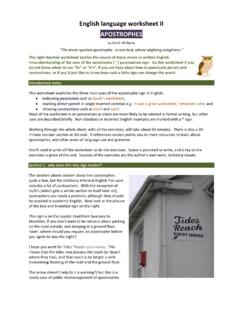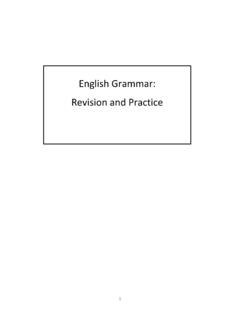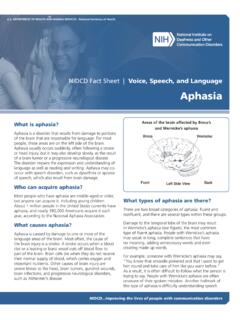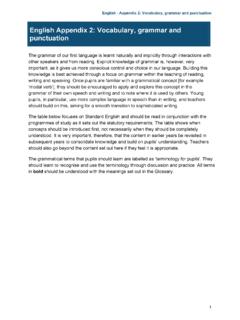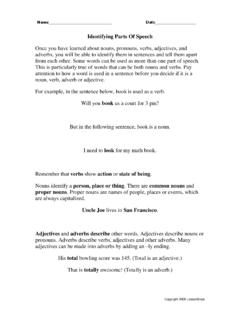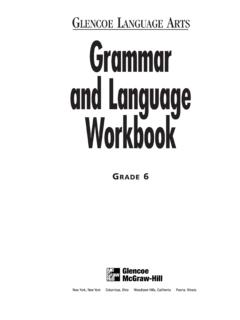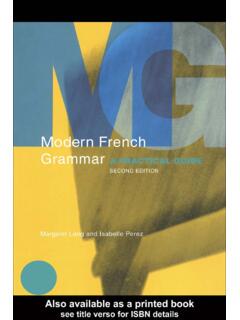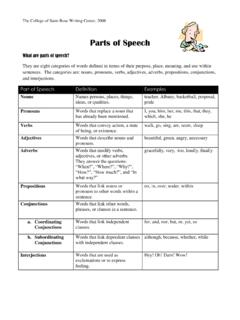Transcription of English language worksheet I PARTS OF SPEECH
1 English language worksheet I PARTS OF SPEECH by Sarah Williams The whole is greater than the sum of the PARTS , or is the soul greater than the hum of its PARTS ?1 This worksheet is the first in our series and shows you what PARTS of SPEECH do in a simple English sentence. Do this worksheet first if you know little or nothing about English grammar , or if you want to do one of our more complex grammar worksheets later on. Introductory notes PARTS of SPEECH are different types of word: noun, verb, adjective etc. In this worksheet , you learn the PARTS of SPEECH needed to make a straightforward English sentence.
2 Working through the whole sheet, doing all the exercises, will take approximately 90 minutes. There s also a revision section at the end, with another 30 minutes work. A references section points you to more resources to learn about grammar . Because we have had to give you some illustrative examples of non-standard or incorrect English , we have marked these with an * sign. You will need to print off the worksheet to do the exercises. Space is provided to write, and a key to the exercises is given at the end. This worksheet is quite a long one, as it covers a lot of ground: you may want to look through it first and just print the sections you need.
3 Our theme is the history of Big Ben, and the British Houses of Parliament. We have freely used and adapted text from Wikipedia, a source we would normally advise against for academic purposes. For the purposes of the worksheet , however, this is an easily available and adaptable text. Section 1: how do we name the PARTS of a sentence? Here s a short sentence describing some of the history of the British parliament: The reigning monarch opened formally the Palace of Westminster in 1852. This sentence contains the following SPEECH PARTS : Abstract noun Proper noun Concrete noun (2) Adjective (2) Article (2) Adverb Verb (in the past tense) Preposition (2) Before we work on what these terms mean, have a go at seeing what you know already.
4 Here s the same sentence separated into words. Write the terms next to the words. Exercise naming PARTS of SPEECH The Palace reigning of monarch Westminster opened in formally 1852. the Check your answer on page 12 (all answers are at the end of the worksheet ). Now let s look at individual PARTS of SPEECH . 1 After Daniel C. Dennett and Douglas R. Hofstadter (1982),The Mind s I Academic Skills, Cardiff Met, June 2010 Page 2 Section 2: what is a noun? A noun can be: a thing, a place, a person, a name, or an idea: monarch, palace, Westminster, and democracy are all examples of nouns. Proper nouns are mainly names of locations and people and are capitalised in English : London Augustus Pugin Queen Victoria Improper nouns are generic things and are not capitalised: monarch parliament clock university intelligence Improper nouns can be concrete or abstract.
5 Concrete nouns are visible things: computer telephone car Gordon Brown Abstract nouns are generally ideas, or concepts: intelligence success elation Darwinism Both proper and improper nouns can be either abstract or concrete. CAREFUL! Unnecessarily capitalising improper nouns because they feel important is a common written error: *Cardiff is the biggest City in Wales. *It contains three and universities should not be capitalised here as they are not proper nouns. However, in the next example, city forms part of a proper noun and should have a capital: Vatican City is the smallest country in the world.
6 Groups of words acting like a noun Palace of Westminster, University of Wales Institute Cardiff, are known as phrasal nouns. These are often also proper nouns. Nouns can be singular shoe library person billboard or plural shoes libraries people billboards Most plural nouns end in s regular plurals but there can be minor spelling changes and exceptions: story stories storey storeys sheaf sheaves The y ies change is the most common. Some frequently-used nouns have different plural forms known as irregular plurals: child children person people fruit fruit There are, unfortunately, many exceptions you can say Fruits of the forest meaning varieties of fruit.
7 American English also has differences of use people at work can be called staffs not staff as in British English . Some dialects of non-standard English tend to drop plurals *It cost twenty pound is quite common, and while it is fine in casual spoken English , it should be avoided in formal written English . Settling these issues, however, is beyond the scope of this worksheet . In the next exercise, circle the nouns in this text. Try to identify the types of noun. Answers are on page 12. Academic Skills, Cardiff Met, June 2010 Page 3 Exercise finding the nouns Big Ben is the nickname for the great bell of the clock at the north-eastern end of the Palace of Westminster in London, and is often extended to refer to the clock or the clock tower as well.
8 Big Ben is the largest four-faced chiming clock and the third-tallest free-standing clock tower in the world. It celebrated its 150th anniversary in May 2009, during which celebratory events took place. The nearest London Underground station is Westminster on the Circle, District and Jubilee lines. Note: nickname is a compound noun formed of an adjective and a noun nick and name which have joined over time. Compounds often start out as hyphenated and then become new words whiteboard and email (from electronic mail). Were you surprised that London, Circle and District, and Jubilee are not nouns here, but that Westminster is?
9 In this text, where they come before station or line, these words are adjectives, or words describing nouns, but Westminster on its own must be treated as a substantive, or noun. Many nouns can act as adjectives too in clock tower , clock is technically an adjective, but you could argue that the two words together are also a compound noun. Section 3: what is an article? A , an and the are articles. These precede nouns a library an orange the university a history of Egypt An is used where a singular noun starts with a vowel, or the sound of a vowel an umbrella (but not an university ). The is mainly used before plural nouns the umbrellas.
10 Certain proper nouns also require the : The Hague The Netherlands The Queen The USA The Houses of Parliament How would the meaning of the first sentence in the Big Ben text change if we substituted a for two of the the articles? Big Ben is a nickname for a great bell of the clock at the north-eastern end of the Palace of Westminster. Big Ben is the nickname for the great bell of the clock at the north-eastern end of the Palace of Westminster. The first sentence means Big Ben is one nickname of several, and the clock has several great bells too. A ( An ) is the indefinite article, meaning one of many; the is the definite article meaning one defined object we use the nickname means there is just one accepted nickname for the great bell.
